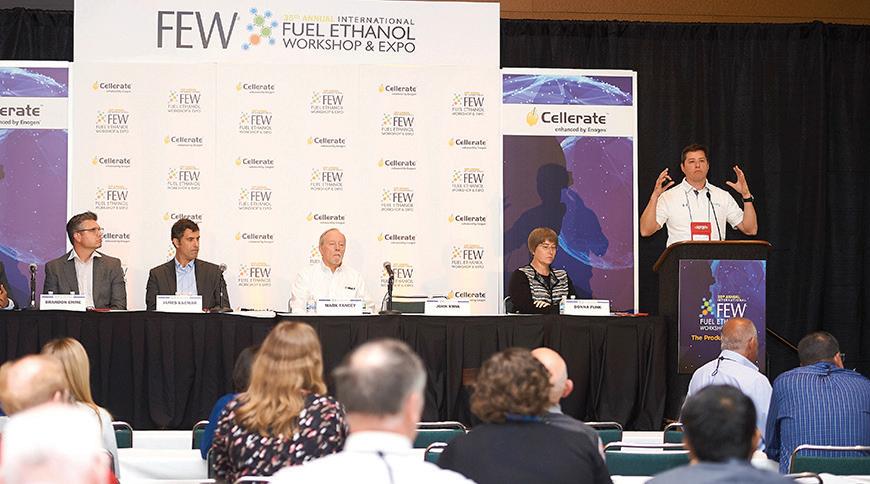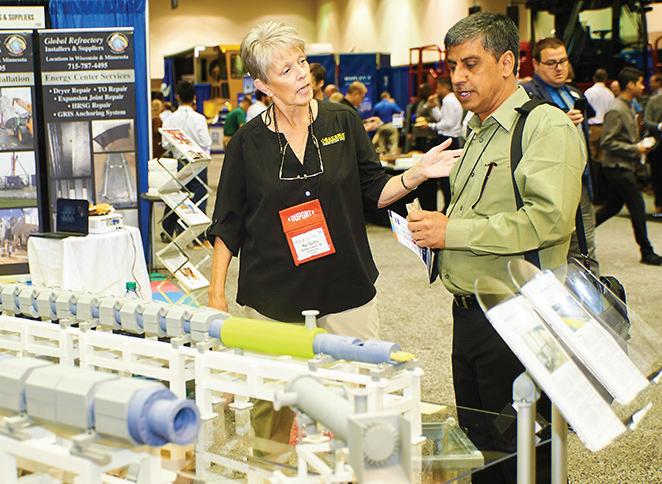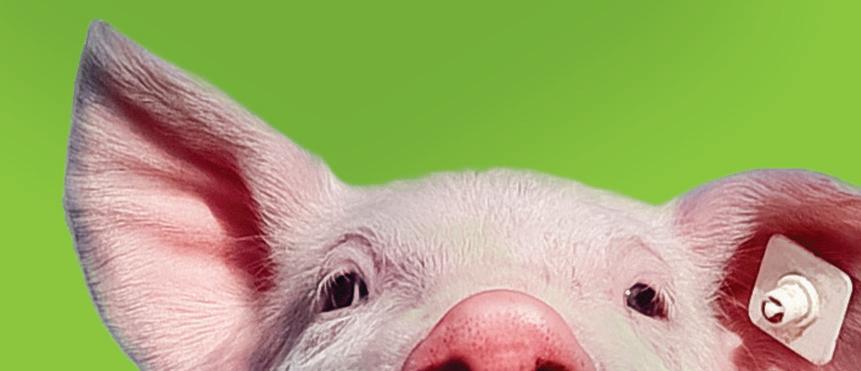
18 minute read
EVENT
FEW TECHNICAL SESSIONS PLANNER
The 2021 International Fuel Ethanol Workshop & Expo, slated for July in Des Moines, Iowa, will bring its traditional slew of experts and information. This guide will help attendees decide which panels to take in.
By EPM Staff




The International Fuel Ethanol Workshop & Expo will once again be face-to-face. Scheduled for July 1315 in Des Moines, Iowa, the 37th annual event will reconvene leaders, experts, vendors, producers and more from across the ethanol industry.
Ethanol Produce Magazine is eager to be back onsite after the pandemic forced a virtual FEW in 2020. “We need to get back to live conference time,” says Mick Henderson, general manager of Commonwealth Agri-Energy LLC and member of Ethanol Producer Magazine’s Editorial Board. “I am fully vaccinated and ready to go to work!” This year, FEW also presents the colocated Biodiesel & Renewable Diesel Summit and the National Biomass Summit & Expo. Ethanol 101 is on the agenda, also, along with the Low Carbon Effi ciency Summit, both slated for July 13. The Low Carbon Effi ciency Summit, new to the event’s agenda, is especially relevant, and features panels such as “Gauging Ethanol’s Likely Future in the Push for a Low-Carbon Economy,” “What’s the Score?: Why a Strategic Effort to Lower Carbon Intensity Must Be a Part of Your Plant’s Go-
Forward Operational Strategy,” “Deployable Approaches for
Lowering your Plant’s Carbon Intensity Score” and more. With developing legislation on both the state and federal levels, lowcarbon topics will be of utmost interest and importance.
“We anticipated that low-carbon fuel production and marketing would yield a good number of presentation ideas and we were very excited with the response,” says Tim Portz, BBI International’s program director. “While ethanol producers have been serving low-carbon fuel markets for years, the industry is anticipating that the Biden administration’s clean energy ambitions will drive even greater momentum into lowering the carbon intensity of produced fuel. We organized all of our low-carbon content into a full day, deep dive on the subject. I think it is going to be a compelling day of presentations.”
Higher-value alcohol markets also emerged as a standout topic in presentation abstracts submitted for the event, Portz says. “Clearly, the COVID shutdown and the sudden pivot to hand sanitizer markets reenergized the discussion amongst producers about broadening their alcohol product offering.
“Finally, protein continues to drive many of the presentation ideas in our coproducts track,” Portz adds. “Clearly, producers are realizing the incredible value of a coproducts program at their facility that places an emphasis on enhancing those feed coproducts by maximizing the value of the protein within them.”
The agendas for FEW and its co-located events are again full, bursting with experts ready to share their knowledge and insights into an industry that saw some hardships in the past couple years, but has proven its resilience and grit.
/// WEDNESDAY, JULY 14 1:30 pm – 3:00 pm
Track 1: Production and Operations High-Grading: Why and How Ethanol Producers are Increasingly Eyeing Specialty Alcohol Markets
The COVID-19 pandemic and the massive and sudden drop-off in transportation fuel use had ethanol producers scrambling to slow or completely curtail fuel ethanol production almost overnight last spring. The flexibility and ingenuity of the industry were soon on display as plant teams reimagined their facilities as producers of specialty alcohol for the exploding hand sanitizer market. While the demand for sanitizer may wane, the lessons of how to best position an ethanol plant to produce varying grades of ethanol will remain. The experts assembled for this panel will review the lessons producers learned when pivoting their production last spring while also considering how this new knowledge will likely be leveraged in the future.
Exploring the Relationship Between Plant Maintenance, Worker Safety, and Overall Profitability
Unscheduled downtime is an eternal bugaboo for ethanol plant operational teams. While the chief aim of plant teams is yield and ethanol throughput, just behind that comes regular maintenance informed by technologically aided monitoring. The presentations in this panel cover a wide portion of the plant campus including fugitive dust capture and control, mineral deposition removal and wear part surveillance. Finally, the contributions of a well-maintained facility to worker safety will be shared.
Track 2: Leadership and Financial Management An Examination of What the 45Q Tax Credit Means for Ethanol Producers
In January, the U.S. Treasury published the final rulemaking for a tax credit available for entities that can successfully capture carbon dioxide and sequester it in either geological formations or put it to use in advanced oil recovery operations. Ethanol producers have long wondered how and when they would be mandated or incentivized to capture and sequester their own carbon dioxide. The 45Q tax credit program is the preamble to answering that question. This panel will help attendees understand how the tax credit works and the early momentum within the ethanol industry to make its promises manifest for producers.
Track 3: Coproducts and Product Diversification Assessing New Opportunities for the Feed Product Streams Generated in Ethanol Production
Over the last handful of years, ethanol producers are increasingly placing a greater emphasis on their plant’s incredible potential to produce an increasingly diverse array of highly valuable protein products, often for markets not traditionally served by ethanol coproducts. This panel includes discussions about the maturing efforts to tweak the traditional distillers grains output to target new markets, but goes further and imagines ethanol plant fermenters as producers of single-celled protein sources for the exploding global aquaculture markets.






PLANT UPTIME IS IMPORTANT TO YOU, SO IT IS IMPORTANT TO US. Our full service team of experts have 20 years of ethanol plant maintenance reliability and uptime history. 24/7 support and ready access to a full inventory and all Fluid Quip equipment parts, ensures that you maintain your plant’s uptime status.

• OEM Parts Warehouse • $1 million+ on-hand inventory • Fully stocked trucks • Overnight/hot shot shipping

PARTS

EQUIPMENT SERVICE

• Factory Trained & Certified • MSC™ Systems • SGT™ Grind Systems • FBP™ Fiber By-Pass Systems • MZSA™ Screens • Paddle Screens • Grind Mills • • Centrifuges Centrifuges

FluidQuipMechanical.com | 920-350-5823 | follow us on on Fluid Quip Mechanical is a division of Fluid Quip Technologies i . RED RIBBON: Angus Ballard, president of Lallemand Biofuels & Distilled Spirits, cuts the ceremonial ribbon to open the expo hall at the 2019 International Fuel Ethanol Workshop & Expo. Tim Portz, BBI International program director (left), hosted the welcome reception, sponsored by LBDS.






PHOTO: KIRSTEN WRAY PHOTOGRAPHY
/// WEDNESDAY, JULY 14 3:30 pm – 5:00 pm
Track 1: Production and Operations Leveraging Best-Available Innovations in Lab Hardware and Programmatic Approaches to Drive Out Process Upsets While Driving in Greater Yield
The first half of this panel is built around two innovations that provide ethanol producers with real-time, online spectroscopy. The aim is to better equip lab teams to understand how fermentations are proceeding early enough in the process to take meaningful and on-target actions. The discussion then moves into a holistic approach to lab management and the argument for incorporating a stepwise quality management program at ethanol plant labs. The panel concludes with an examination of a novel testing approach for chloride and sulfates in fuel ethanol.
Effectively Mining Plant Data Today to Shape and Guide Operational Strategies Tomorrow
Unless it is put to work increasing yield, captured operational data is just noise. The presenters in this panel will offer attendees a look at what the future of data capture and use might look like. While the present finds plant operators capturing and using data to guide operational decisions, this panel asserts that the future is far more ambitious. These presenters will ask producers to imagine the role artificial intelligence might play in their operations and the payoff for those teams willing to embrace its potential.
Track 3: Coproducts and Product Diversification If A Little is Good: Liberating and Capturing More Corn Oil at Your Ethanol Plant
This panel features a compelling mix of presentations that will expand attendees’ understanding of not only increasing the capture rate of corn oil but also the importance of its contributions to the plant’s bottom line. Additionally, presenters will address the giveand-take nature of oil extraction and outline where and how producers can liberate more oil in their production process and the impact on other coproduct streams when doing so.
Track 4: Infrastructure and Market Development Clean Fuels Policy Work in the Midwest
This discussion will provide attendees with a look at the effort to imagine and make manifest a clean fuels policy in the Midwest, the birthplace of renewable fuel production. The report “Clean Energy Fuels Policy for the Midwest” was released in 2020 but was not afforded the opportunity for a live public discussion last year because of the COVID-19 pandemic. The discussion will offer attendees a unique opportunity to hear about the report’s aims, its findings and the ongoing efforts to get its ideas some traction with policymakers.
/// THURSDAY, JULY 15 8:30 am – 10:00 am
Track 1: Production and Operations How Innovations in Yeast Strain Development are Taking Center Stage in Plant Optimization Strategies
In the never-ending quest for increased yields and reduced expenses in fermentation, ethanol producers continue to turn to their yeast populations. Historically, producers could choose between yeasts that were hearty and resistant to changes in pH or temperature or yeasts capable of high yield, but not both. The presenters in this panel will assert that this either/or era may be coming to a close as yeast providers work to produce varietals that are robust, high-yielding and capable of expressing the necessary enzymes for greater starch solubilization.
Telling the Tale: What Plant Data Can Teach You About Your Operators, Fermentations and Vital Plant Components
As the ethanol production process has matured, the ability to capture and utilize operational data has emerged as a key differentiator between the industry’s most successful and efficient operators and everyone else. This panel, one of two at the conference to look specifically at data capture and use, outlines how producers can construct a cohesive operational plan from a dizzying slug of inbound data. This panel features discussions that highlight how data can be used to understand everything from the thoroughness of cleaning by specific operators to when and how to intervene with an underwhelming fermentation cycle.
Track 2: Leadership and Financial Management A Comprehensive Look at De-Risking Ethanol Plants and Production
Profitably manufacturing fuel ethanol requires management teams to put millions of dollars in play, hit yield targets and successfully market an increasing array of final products. Subtle fluctuations in the price of inbound corn and natural gas or unexpected dips in ethanol prices can lead to evaporating or vanishing margins. The most successful management teams deploy and refine a suite of risk management approaches to mitigate risk wherever possible. This panel will examine risk management in the context of an industry exiting arguably its largest business disruption ever.
Track 3: Coproducts and Product Diversification The Technological and Policy Pathways to Higher-Value Fuel and Chemical Markets for Ethanol Producers
The industry-wide crash course in producing alternative alcohol products via the virtually overnight rise of the hand sanitizer market in the second quarter of 2020 rejuvenated the industry’s belief and confidence that it could and should establish a foothold in new, higher-value alcohol markets. These ambitions are nearly as old as the industry itself, but this panel highlights that the technologies enabling access to these markets are ready for deployment now.
Introducing ®the SYNERXIA Gem Collection
The next advancement in high-performance yeasts to make your plant shine.
www.xcelis.com

COOPER'S KEY: Geoff Cooper, president and CEO of the Renewable Fuels Association, was the keynote speaker at FEW in 2019.
PHOTO: KIRSTEN WRAY PHOTOGRAPHY
/// THURSDAY, JULY 15 10:30 am – Noon
Track 1; Production and Operations Which Arrow in the Quiver?: Surveying the Options Available to Producers for Controlling Bacterial Outbreaks within their Process
That bacterial infections rob ethanol producers of yield is wellunderstood, but the art of cost-effectively controlling these infections continues to evolve. The economic impact of what does and does not happen in plant fermenters continues to inspire robust research in the microbiology that is the beating heart of an ethanol plant. This panel will challenge lab managers to think in new ways about the bacterial populations that will inevitably find their way into their production environment, how to eliminate them and some discussion about when and how certain bacterial ethanologens might actually offer some yield benefit.
Two Birds, One Stone: Aligning Your Plant's LDAR Program to Satisfy Regulatory Requirements and Sustainability Ambitions
The presenters on this panel will provide a compelling argument for a complete audit of a plant’s leak detection and repair program owing to the increased regulatory scrutiny around the subject. In the short term, unresolved leaks cost ethanol plants real dollars, but the long-term risk of inspection and a Notice of Violation carry far greater financial risks. This panel will explore not just the technical aspects of detection and repair, but also the record-keeping discipline that will assure regulators of your facility’s commitment to compliance.
Track 3: Coproducts and Product Diversification How Decisions Made in Upstream Production Processes Impact Downstream Coproduct Characteristics
The composition of the yielded coproduct streams at ethanol plants are the result of the production decisions made upstream, often reaching all the way back to fermentation. This panel will explore the consequences for coproduct quality and composition when producers deploy new process approaches upstream. This panel asserts that the impact of new processes on economically vital coproduct streams must factor into the decision-making process of increased fiber and oil extraction, enzyme use and the deployment of novel fractionation technologies.
Fiber Fundamentals: Pathways to Make Available the Plant Fiber Streams for Downstream Conversion
There is a widespread feeling that the evolution of corn ethanol plants to integrated biorefineries will not be complete until the conversion of plant corn fiber streams to cellulosic ethanol is as widespread a practice as corn oil capture has become. This first of two panels at the conference exploring this topic will offer producers a comprehensive look at the state-of-play in fiber isolation, separation and preparation for downstream conversion.
/// THURSDAY, JULY 15 1:30 pm – 3:00 pm
Track 1: Production and Operations The Biological Levers Available to Producers Looking to Boost Fermentation
The second in a series of presentations looking specifically at fermentation, this panel turns its gaze specifically to yeast nutrition. The discussion opens with a look at how over the course of a decade proteases have been coopted to convert proteins into necessary free amino nitrogens. The presentation promises an update on the approach and how it has been refined to mitigate some early concerns. The remainder of the panel helps producers and lab teams consider the downstream consequences that fermentation nutrition efforts may have on important coproduct streams.
Track 2: Leadership and Financial Management Back to the Future: Making Sure Your Plant is Inside the DeLorean
With the inevitable day-to-day challenges of operating a fuel ethanol production facility, it is easy to understand how plant management teams and boards can be laser focused on the challenges of today. Still, plant teams know the value of lifting their gaze from the here and now and considering future opportunities and challenges. This multi-disciplinary panel will offer producers an opportunity to consider the future of their facilities from several different perspectives, including capital expenditures, product differentiation and new financial management approaches.
Track 3: Coproducts and Product Diversification Fiber Fundamentals II: Converting Captured Fiber to High-Value Fuel and Feed Products
Picking up where the conference’s first corn fiber panel left off, these presentations bring the viability of corn fiber conversion into sharper focus. What has been learned from the industry’s first deployments of these promising technologies? And, where does this technology fit into the industry’s next decade as it sharpens its low-carbon ambitions, and increases its overall societal value by delivering an even wider array of fuel products from its corn inputs?
Track 4: Infrastructure and Market Development The Latest Regulatory, Legislative Initiatives Impacting Biofuels
It is easy to forget, amidst the excitement of the promise of new fuel and feed products, that our industry is responsible for producing a fuel product with exacting specifications for a highly regulated marketplace. That ethanol has a place in the transportation market at all is the result of years of work to ensure the product is understood and endorsed by the regulatory community. This panel is an annual conversation featuring those professionals engaged in this important work. Panelists will provide attendees with a comprehensive snapshot of the regulatory impediments that have emerged in the past year and how the industry plans to overcome them.
XCELIS® Yeasts SYNERXIA® SAPPHIRE
The most powerful combination of yield, robustness and enzyme expression in a yeast.
www.xcelis.com
As motorists begin returning to the roads, Unleaded 88 is poised for rapid growth.
In fact, a survey by Pilot Flying J shows that 65 percent of U.S. drivers are reporting big plans for extra summer travel once COVID-19 restrictions are lifted. And we already know that customers who try Unleaded 88 are coming back again and again to take advantage of this more affordable, cleaner fuel.
Find Unleaded 88 for your next road trip at
GetBiofuel.com/fuelfinder

CROWD COLLAGE: Attendees mill around the expo hall at the 2019 FEW.
PHOTO: KIRSTEN WRAY PHOTOGRAPHY

/// THURSDAY, JULY 15 3:30 pm – 5:00 pm
Track 1: Production and Operations Deploying the Best Available Cleaning Regimens with an Eye on Efficiently Achieving Your Desired Outcomes
Ethanol producers know that plant cleaning programs go far beyond the simple deployment of a growing list of available surfactants, inhibitors and acid cleaners. This panel features presenters who promise to look deeper than just a list of available treatment options, and into how to best incorporate them into a comprehensive and well-considered program. The discussion begins with a review of the lessons learned from bringing plans out of prolonged outages due to the pandemic turndown, cleaning and readying for service.
Overcoming the Operational Challenges that Come with Water and Wastewater Management at Ethanol Plants
Moving water and syrups through the ethanol production process is an energy-intensive proposition that if mismanaged can lead to yield losses and diminished profitability. Further, wastewater management creates environmental and regulatory challenges that plant teams must keep top of mind. The presenters in this panel will champion technologies that drive out headaches and expense while driving in efficiency and increased up-time.



Track 2: Leadership and Financial Management Making Sense of the Required Permits for Existing and Planned Product Outputs
When the pandemic is at long last behind us, the ethanol industry may well view it as the catalyst that finally made product differentiation a vital component of every producer’s strategic plan. The rush to serve the hand sanitizer markets is the ready example, but producers also recognized how suddenly demand and margins can vanish for any product in their portfolio with little warning. This panel will feature panelists ready to remind producers of the permits required to manufacture and sell those new products and best practices for incorporating them into your existing permit program.
Track 3: Coproducts and Product Diversification Driving Additional Value into Your Coproduct Program By Bringing Protein Streams into Sharp Focus
The promise of increased profitability continues to stoke producer interest in a strategic effort to maximize protein in their feed coproduct outputs. The first three presentations feature technologies and process approaches available to producers ready to embrace a production environment optimized for higher protein. The discussion concludes with a producer presentation on how producers can better understand and measure the protein they have succeeded in isolating and incorporating into their coproduct streams.
XCELIS® Yeasts SYNERXIA® RUBY
The new standard in high yield yeast driving plants to the peak of performance.
www.xcelis.com












